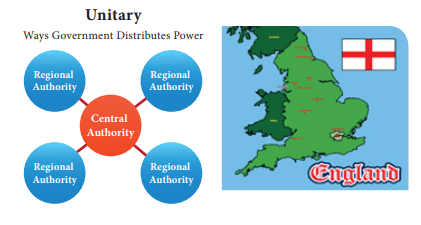Definition, Merits, Demerits, Features - Unitary Form of Government | 11th Political Science : Chapter 6 : Forms of Government
Chapter: 11th Political Science : Chapter 6 : Forms of Government
Unitary Form of Government
Unitary Form of Government
A unitary system of government, or unitary state,
is a sovereign state governed as a single entity. The central government is
supreme, and the administrative divisions exercise only powers that the central
government has delegated to them.

England, France, Japan, Sri Lanka are examples of Unitary Form of governments.
In a Unitary form of government all
authorityandpowervestedinasinglecentre whereas in a federal form of government
authority and power distributed between centre and the constituent units. Even
in a Unitary form of Government there might be a lot of decentralization of
authority but we cannot claim it as a federal system.
Definition:
Some leading political thinkers defined unitary
form of government as follows:
A.V.DICEY: “Habitual exercise of supreme legislative authority is by one central
power”
GARNER: “Where the whole power of government is conferred by the constitution upon a single
central organ”
C.F.STRONG: “Two important qualities of the Unitary Government”.
They are:-
i.
The supremacy of the central government;
ii.
The absence of the subsidiary
sovereign bodies.
The distinction between subsidiary law-making
bodies and subsidiary sovereign bodies is the distinction between the local
authorities in a unitary state and constituent units in a federal state.
K.C.Wheare : A constitution, Unitary and highly centralised on paper , may be almost federal in
practice;
A federal constitution may be, in practice,
Unitary, as indeed are the so-called federal constitutions of Mexico,
Venezuela, Brazil and Argentina”.
Merits Of Unitary Form Of Government
a. Suitable
for small countries.
b. There is
no conflict of authority and responsibility.
c. A unitary
government will make prompt decisions and take speedy action.
d. A unitary
government is less expensive.
e. Amendments
to the constitution are easy.
f. There is
unity, uniformity of law, policy and administration.
De-Merits of Unitary Form Government
a. It is not
suitable for big countries.
b. The
central government will have to tackle so many complex problems that lead to
administrative delay.
c. The
central government will not concentrate on local problems, local interest and
initiative.
The concentration of powers may pave way for the
despotism of the central government.
Unitary Features Of Indian Constitution
i.Strong Centre
The division of powers is in favour of the Centre
and highly inequitable from the federal angle. Firstly, the Union List contains
more subjects than the State List. Secondly, the more important subjects have
been included in the Union List. Thirdly, the Centre has overriding authority
over the Concurrent List. Finally, the residuary powers have also been left
with the Centre, while in the US, they are vested in the states. Thus, the
Constitution has made the Centre very strong.
ii. Central Government’s control over state territory
Unlike in other federations, the states in India
have no right to territorial integrity. The Parliament can by unilateral action
change the area, boundaries or name of any state.
iii. Single Constitution
Usually, in a federation, the states have the right
to frame their own Constitution separate from that of the Centre. In India, on
the contrary, no such power is given to the states. The Constitution of India
embodies not only the Constitution of the Centre but also those of the states. Both
the Centre and the states must operate within this single-frame. The only
exception in this regard is the case of Jammu and Kashmir which has its own
(state) Constitution.
iv. Flexibility of the Constitution
The bulk of the Constitution can be amended by the
unilateral action of the Parliament, either by simple majority or by special
majority. Further, the power to initiate an amendment to the Constitution lies
only with the Centre. In India states don’t have the right to propose amendment
unlike in U.S.A
v. Unequal representation of states
In a federation states are given with equal
representation with regard to upper house, but in India states are not given
with equal representation with regard to Rajya Sabha.
vi. Emergency Provisions
During an emergency, the Central government becomes
all powerful and the states go into the total control of the Centre. It
converts the federal structure into a unitary one without a formal amendment of
the Constitution. This kind of transformation is not found in any other
federation.
vii. Single Citizenship
India adopted the system of single citizenship.
There is only Indian Citizenship and no separate state citizenship. All
citizens irrespective of the state in which they are born or reside enjoy the
same rights all over the country. The other federal states like US, Switzerland
and Australia have dual citizenship, that is, national citizenship as well as
state citizenship.
viii. Single Integrated Judiciary
It means that all the courts of India are in a
hierarchical order from the lower courts to the Supreme Court of India. Courts
in India have Original and Appellate Jurisdiction.
ix. All India Services
It has the features of All India Services or
Central Services, and the State Civil Services. The Central and All India
services promotes uniform administrative system and process throughout India.
x. Appointment of Governor
The governor of a state is not elected but
appointed by the president and holds office at the pleasure of the president.
He is the head of the executive in the state. He has powers like Legislature,
Executive Judicial and emergency powers.
Related Topics